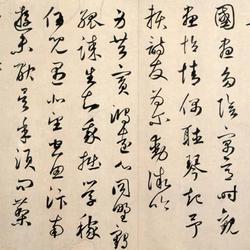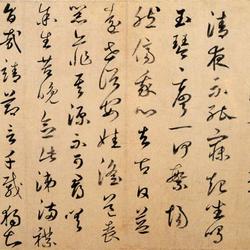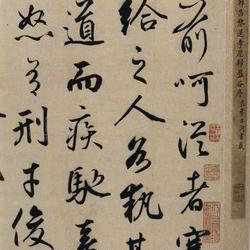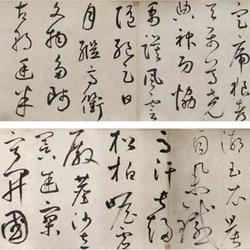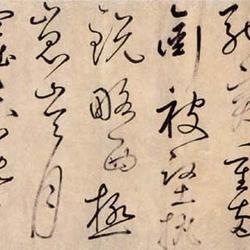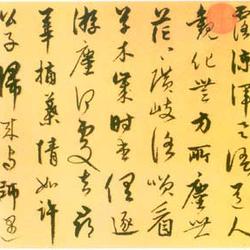
Xian Yushu's "Cursive Poetry Praise Scroll" (part), 43.4 cm in length and 876.4 cm in width, collected by the Shanghai Museum
Xian Yushu's "Cursive Poetry Praise Volume" is an ink version. Written in the sixth year of Dade (1302). The whole volume has seventy-one lines, with each line ranging from two to four characters. The first book is "Praise to the Image of Xue'an" (Xue'an is the author of Puguang) poem, and the second book is "Praise to the Moon-Sucking Cup". For example, the first part of the hymn lacks the six rhymes of "secure", "liu", "qiu", "贴", "ball" and "cow". At the end of the volume there are two chapters of rhymes by Lu Juren, and the calligraphy is also impressive. This volume is now in the Shanghai Museum, and a photocopy has been published by the Hong Kong Book Publishing House.
The calligraphy in this volume is strong, full of power, majestic and ups and downs, the brushwork is vertical and horizontal but solid, the momentum is majestic yet regular. He often pays attention to details when writing, such as the dense and dense layout of the entire article, the clever use of Fei Bai, and the clever arrangement of sharp edges and silk ribbons. When writing, it gives people a generous and natural feeling of being unhurried, graceful and unhurried. All of them show his true qualities as a first-class calligrapher in the Yuan Dynasty. Although the beginning of this "Poetry in Running Script" is missing, it is still a rare masterpiece of Xian Yushu's calligraphy, and it also provides precious information for the study of Xian Yushu's calligraphy art.
Explanation:
...The huge list shines in Jiuzhou, and people with a lot of money are vying for the title.
The emperor opened Zhao Wenli's nest, returned and lay down in the woods in his clothes.
One day, Xian Bifu traveled far to the south, crossing Wuling Mountains and east Fujian Province.
The Tao River is full of miasma, and the Yu point in Kuaiji is rarely left.
The mountain king protects the post boat behind the river, and the horse runs towards Fang Bo and the princes.
Jian Yu freed himself from the poor sea, and Jie Chu (i.e. "encounter") was in harmony with each other.
When the general manager asked, now that he is old, he realizes that Dou Sui (i.e. "Dousuo") is a Qing cultivator.
The poems and portraits are really self-intentioned, and the paper ends with three thousand years of history.
Like the moon cup
Made from a small coconut from Hainan, it looks like an angry frog (click here)
I will open my eyes, widen my belly, stare at the Emperor's gaze, and if my desires are not satisfied, I will cut off my feet, cut my intestines, and use the light of the moon as my wine cup. The truth of the expedition was due to Zhi Bo, and the warning to overturn the chariot was due to the king of Yue. If the drums stop playing, the shadow moth is in the hall, drinking the clear dew of the osmanthus flower, smelling the lingering fragrance of the heavenly wine, feeling the vulgarity of the golden king, and ridiculing the green and yellow color of the sacrifice statue.
Jirong used this paper to commemorate his humble work. He took advantage of the opportunity to write this and should not show it to others. Poor students are rare in Shu.

